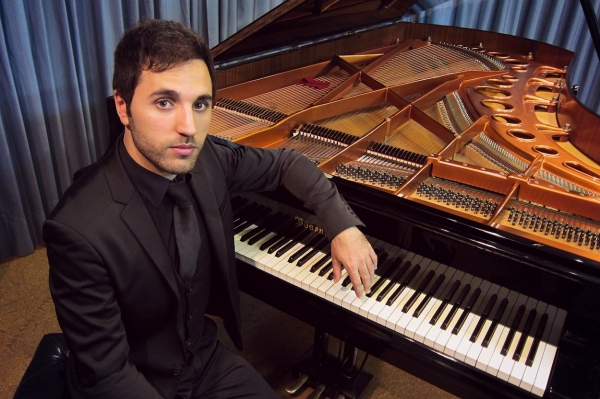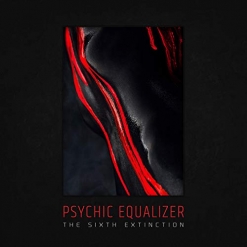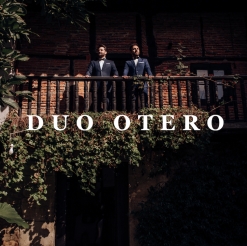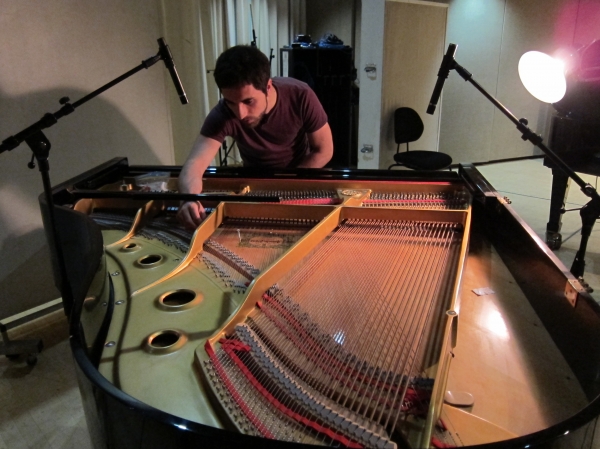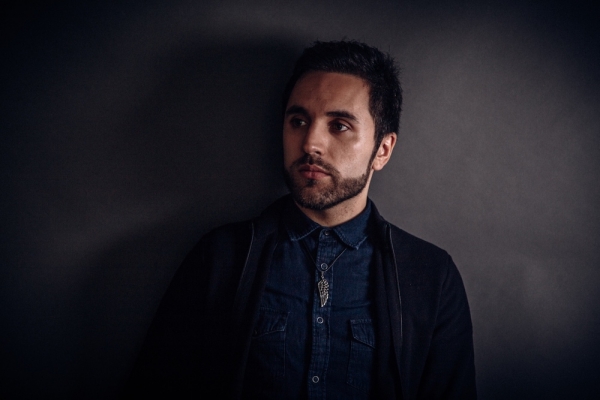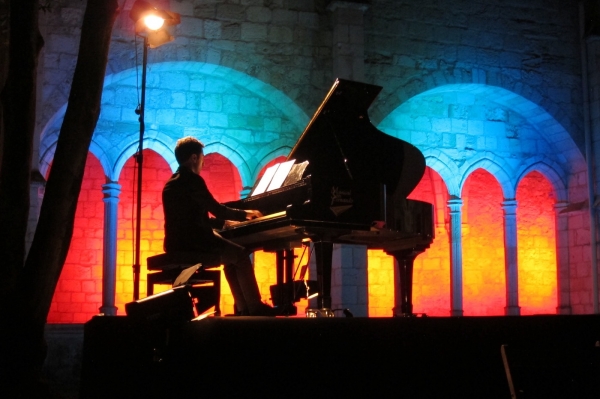One of the things I have found the most rewarding about writing reviews and running the MainlyPiano.com website has been the opportunity to find artists I never would have found otherwise. Spanish composer/pianist Hugo Selles is one of them. I first heard his music in 2012 when he sent me the debut album by Psychic Equalizer,
Memories of a Cold Place. He was still in his early 20’s and in graduate school, but the music was very powerful and accomplished. I reviewed a couple more Psychic Equalizer albums over the years, and then in the fall of 2019, Hugo sent me his first album under his own name,
Introversia, and
Glerskáldskapur a few weeks later. Both albums are incredible, so it seemed like the perfect time to do an interview and talk about all of this. In the process of doing this interview, I am even more impressed with the artist who is Hugo Selles. I hope you will enjoy getting to know him, too!
KP: Hi Hugo! Is 2020 off to a good start for you?
HS: Hello Kathy! Yes, absolutely, many exciting plans for this new year!
KP: 2019 was a quite a year for you, releasing four albums that are very different from each other. Two were under your own name, one was as Psychic Equalizer, and one with Duo Otero. How are the albums different from each other?
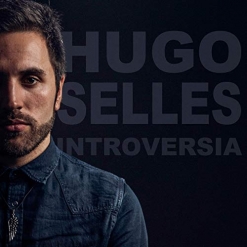
Click on two upper album covers
to go to Kathy's reviews.
HS: I think each of them shows a different side of my musical interests, from late 19th and 20th century classical music to progressive rock, going through contemporary jazz, avant-garde, minimalism and even pop.
KP: The most-recent release, Glerskáldskapur, is more or less the soundtrack to a performance piece that you created with two poets, Sergio Balbontin and Julio Ceballos. First, what does the title mean?
HS: There’s not an actual translation of it, as it is a concept made up from Icelandic words. It combines glass and poetry, suggesting the meditative state of mind that cold and icy winter landscapes can lead us to.
KP: The live show includes you playing a combination of your music and a fascinating combination of other composers, along with poetry readings and videography. Tell us a bit about the show - what it’s about and how the various art forms work together.
HS: I think that in order to fully understand what Glerskáldskapur is, it’s necessary to see it live. The stage is in complete darkness - which is actually a real challenge for me to perform, but I just love the atmosphere that it creates. While beautiful imagery is projected, including microscopic images of snowflakes, winter scenery and some amazing time-lapses of storms and the change of seasons, I perform the music from a corner, with a piano and a keyboard. Simultaneously, the poems are either projected on the screen or recited from backstage. I must say it works out really well!
KP: How many performances have there been so far?
HS: Just three so far. It’s a bit difficult to match our agendas, but it’s a long-term project, so I’m sure many are still to come.
KP: I really hope I get a chance to see it! Only a few weeks before the release of Glerskáldskapur, you released Introversia, your first album under your own name, and one of my favorite albums of 2019. That album also contains a fascinating combination of original improvisations and improvisations on music by other composers. What inspired that album?
HS: I have a strong passion for improvisation. I believe it’s fundamental for a musician to develop that skill. Not to perfection of course, but at least have some notions. It’s a shame improvisation has been forgotten from academic classical training for years. We tend to associate improvisation with jazz, but that’s far from the truth. Many of the great classical composers were incredible improvisers, and not to mention folk musicians! I find improvisation gives me a freedom no other kind of playing does. Not even my own compositions. When I’m improvising, everything is possible. It’s a constant struggle between rational structure and the feeling of the moment. Somehow I like how fresh and spontaneous it can be but also how incredibly challenging it can rise up to be. Introversia is all about that. I switch from one style to another without any regret or prejudice. All the tracks were recorded in one take, so there are obviously mistakes, and that’s in fact something that I like about it. We seem to be getting used to a kind of recorded music that’s totally unrealistic.
KP: I agree. Perfect performances are very rare.
HS: But that's the clue actually. If you listen to Alfred Brendel recordings of Mozart's concertos, they are not perfect, and that's what makes them perfect I believe. Technology should be used in favour of music, not against it.
KP: That's a really interesting point! I first heard your music when you sent me the first Psychic Equalizer album, Memories From a Cold Place, in 2012. Are you the only musician on the earlier Psychic Equalizer albums?
HS: Yes I am. I started the project Psychic Equalizer by myself, as a sort of alias. It has changed quite a bit since then, as I can now name it a band.
KP: The goal of Psychic Equalizer was to explore a variety of themes and concepts without being too concerned about music genres or categories. What were some of the concepts behind the albums?
HS: I don’t know if it’s because of my own personal experiences or if the place I grew up in had a major influence on me – it could be quite isolated in winter. But, I must admit it, I tend to be obsessed with loneliness. Not necessarily just physical, but also emotional or philosophical. I can see now how all the albums that have been published so far approach that concept in a different way. The first one, for instance,
Memories From A Cold Place, refers to the solitude of being alone in the open nature. Although I didn’t intend it in a depressive way, it has turned out to be a pretty sad album. The following one,
Madrid, which I’m not particularly proud of, speaks about the solitude of modern life in big cities. Later on,
The Lonely Traveller became the first recording I was totally happy with. It talks about the transition from childhood to adulthood, while allegorically defending equality and human rights.
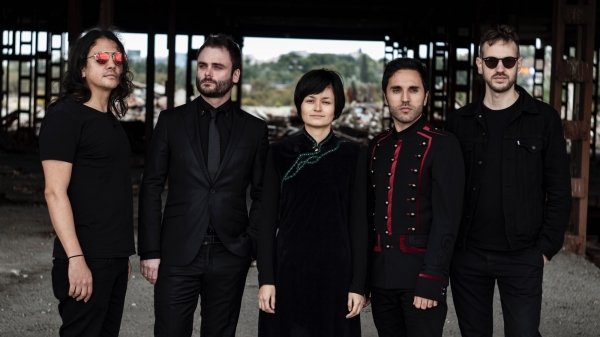
The current line-up of Psychic Equalizer
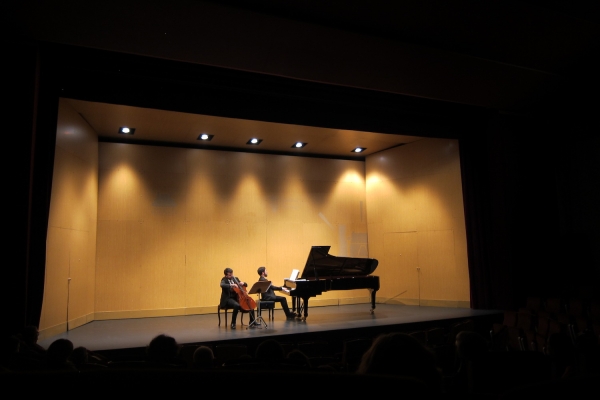
Duo Otero in concert
KP: Psychic Equalizer’s 2019 release, The Sixth Extinction, has quite a few other musicians on it. What is the concept behind that album?
HS: As I mentioned before, we’re now a fixed line-up and we surround ourselves with some exceptional collaborations. This album talks about the critical loss of wildlife we’re undergoing and how this could lead to our own extinction as a species.
KP: It’s a very powerful album. Your fourth album of 2019 is Duo Otero, a classical piano and cello duet album with Miguel Diez. On the album, you perform music by Jules Massenet, David Popper, Dmitri Shostakovich and yourselves. How did you choose the music?
HS: It’s our first album together. At the time it was recorded, we had already been playing together for a couple of years. So I guess the idea of the album was to show some of the stuff we’ve been performing. Funny fact, which we didn’t realize until after it was finished; the whole album is in the key of D Major and D minor, and that actually translates to a more coherent listen.
KP: Interesting! I didn’t notice that!
What do you have planned for this year?
HS: Quite a few things. Firstly - and probably the most exciting for me - we’re giving a pretty big concert with Psychic Equalizer in the city I live in. After that, a tour in China with Duo Otero and violinist Kehan Zhang; and some amazing soloist opportunities such as performing Rachmaninov’s 2nd Piano Concerto in Madrid. This year is also the 250th anniversary of Beethoven, so I already have some closed dates performing some of his wonderful sonatas. Also, I really hope I will manage to finish a solo album I’ve been dealing with for a long time. I was unable to release it before as many other things kept happening in between. This album is a sort of homage to the iconic band Supertramp. Basically, the album consists of arrangements and improvisations using different piano techniques. Oh! And of course, how could I forget? I’m coming to New York in April (first time in the US!) for another concert - this time with my 2 pianos and percussion ensemble: Seit Quartet.
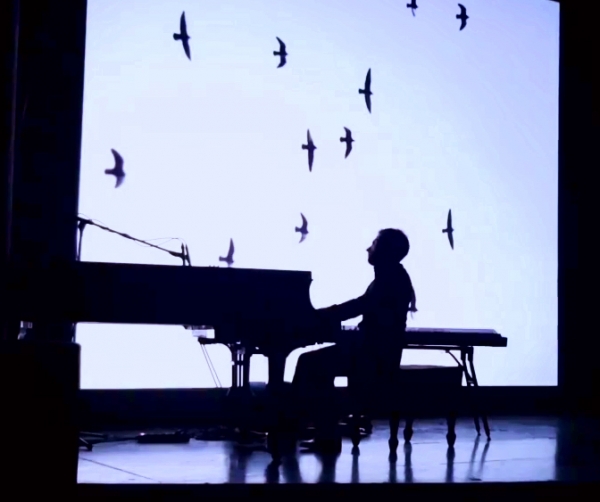
GLERSKÁLDSKAPUR Live
KP: Wow! I wish I wasn’t on the other side of the country!
With several degrees in music, are you also teaching in addition to composing and performing?
HS: Yes indeed. I think most musicians have to or had to teach at some point in their lives.
KP: Let’s talk about your life and career so far. Where were you born and where did you grow up?
HS: I was born where I live nowadays, in Santander, northern Spain. Although I grew up in the countryside, up in the mountains, and moved out at age 16 due to my musical studies.
KP: Are any of your family members musicians?
HS: Not in my closest family. Other relatives have learned to play an instrument or sing in choirs, but never pursued a musical career.
KP: When did you start playing music?
HS: When I was 6 years old I started playing piano. That’s as far as I can remember. But I imagine, as most children, that I probably liked to hit some “bucket-drums” when really little.
KP: That seems to be pretty universal! When did you start your music training?
HS: Right after the first piano came to our home, so from the beginning.
KP: Which instruments do you play besides piano?
HS: I haven’t properly trained to play another instrument. Although I guess I have found my way around keyboards and synthesizers. Besides that, sometimes I strum some chords on the guitar, but nothing fancy at all. I do have a pretty cool collection of small percussion instruments from around the world which I’ve already been collecting for quite a while. Actually, most of those have been featured in our latest Psychic Equalizer album! But again, I wouldn’t call myself a percussionist.
KP: When did you start writing music?
HS: For me it was just something natural or instinctive to do from the start. At age 7, I already had a nice little book of small pieces written by me.
KP: Interesting! Who and what do you consider to be the major influences on your music?
HS: That’s an easy one! Nature above anything else. In addition, even though she might not like the fact that I mention it, my partner. Believe me, I didn’t intend that to sound cheesy at all!
KP: It sounded very nice! Appreciation is good!
Where did you earn your college degrees?
HS: I studied my Bachelor with specialization on classical contemporary repertoire at the Higher School of Music of the Basque Country, known as Musikene. For several reasons, it was a hard time of my life. I wasn’t properly diagnosed, but I felt deeply depressed most of the time. That’s why somehow, after that, I moved to Madrid to study a bit of sound engineering and music business at SAE Institute. I needed to switch off from piano, but soon realized that I couldn’t live without it. At that time, the work situation for musicians in Spain was precarious, not that it isn’t hard nowadays, but back then was unbearable. So I decided to apply to different conservatories in Scandinavia and other places in Central Europe. I fell in love with Copenhagen when I first visited it and I was lucky enough to get in. I spent almost 5 wonderful years there doing my masters and a special post-graduate program which is part of their curricula called Soloist Class.
KP: Have you written much music for television and/or films?
HS: I wouldn’t say much, but yes, three soundtracks so far. Two of them for documentaries and one for a short fiction film. Writing for films is fun and also helps you to develop the “acting” part as a performer, as you always have to express the right emotion. The process is somehow similar to learning a classical piece.
KP: You obviously have a very eclectic taste in music, which I appreciate. Do you think Europeans are more accepting of a wider range of musical genres? It seems that more and more often, people here in the US listen to classical only or jazz only or country only and think that “their” chosen genre is the only one that is “good” or “quality” music. Is that true overseas, too?
HS: Mmmm… That’s a pretty tough question! Surprisingly, even though Europe is tiny in comparison to other parts of the world, some things can actually be rather diverse from one country to another. It’s interesting what you say about the US. I have been recently watching some jazz masterclasses online and I was quite shocked to find out how purist some of the professors were. I surely don’t believe that’s a positive thing, even less coming from jazz musicians! On the other hand, correct me if I’m wrong, but the music industry in the US seems to be much more well-organized and respected than anywhere else in the world. I envy that. It can be a bit chaotic in Spain at times. Ironically, I recently read Spain has the highest streaming numbers, in terms of classical music, of the whole of Europe - when it’s obvious that so many people here have no idea about how difficult it is to become a professional musician in that genre! Anyway, I’m going a bit off topic, pardon me. I found music, in general, is a lot more respected in Scandinavia. There is also more of a musical eclecticism up there. Here in Spain, the vast majority of people listen to reggaeton, trap or crappy so-called flamenco-pop – which I honestly still haven’t understood why. As you know, I’m very open-minded and I always try not to judge too quickly - listen three times before giving an opinion is my rule. But…! Going back to your question. I have friends living in Germany, France and Netherlands and, from what I’ve been told and what I’ve been able to notice myself, people seem to appreciate music a lot more in those countries. If it’s good quality stuff, it’s good, no matter what kind of music it is. I believe there’s soooo much fantastic music to enjoy, why would anyone want to deny the marvelous musical achievements of others without giving it a try? That’s something that has always shocked me.

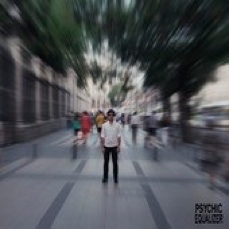
Click on album covers
to go to Kathy's reviews.
KP: I couldn’t agree more!
What has been your most exciting musical moment to date?
HS: That’s a hard one, too! Definitely my final concert for the Soloist Class in Copenhagen is on top of the list. I premiered my piece ‘La Bestia’ for female choir, 2 pianos and percussion and played Schumann’s Symphonic Études opus 13, one of my ever-favourite pieces, among other things. And, although it hasn’t happened yet, I’m pretty sure the concert with Psychic Equalizer in May is going to be superb! But those are concerts and I have to say I enjoy being in a recording studio, too. As I usually like to say: the stage, the studio and the mountains. Those are my three favourite places. So every time I submerge myself into the recording mood is extremely exciting.
KP: Who are some of your favorite composers?
HS: It varies depending on my emotional state, the season or it even changes as I grow older. Like anyone else, I suppose. Despite that, I can certainly say Beethoven, Rachmaninov, Shostakovich and Bartók are absolutely incredible and I never get tired of re-discovering their music. I think in, let’s call it “recorded music,” a lot depends on the production. That’s why some of those who stand out for me, because they also pay attention to that aspect - therefore it’s more similar to arranging classical music on a score; are the jazz fusion duet formed by Pat Metheny and Lyle Mays; the very particular case of folk musician Stephan Micus; or the team created by Alan Parsons, Eric Woolfson and Andrew Powell, who were known as The Alan Parsons Project. Oh, and of course: Kate Bush. She’s just so creative in every level… I used to listen to another band day and night a few years back: Radiohead. Haven’t been following their most recent stuff though, maybe I should! On a different musical sphere, although I haven’t listened to everything he has done, but we have to admit that Yann Tiersen is remarkable. So simple music, but so characteristic at the same time. You just need to hear a couple of bars to know is him, even if he is doing the same harmonic progressions as everybody else.
KP: A very eclectic group (not surprisingly!). Who are some of your favorite performers?
HS: Recently, I’ve been listening to power and prog metal bands such as Stratovarius and Dream Theater. All of their members are capable of amazing things!! Not the same style obviously, but Ravi Shankar, Jan Garbarek or Paco de Lucía are also excellent at what they do. Anyhow, if we focus more in piano players, I would say Brad Mehldau is stunning. I’ve seen him live twice and it was mind blowing. Also in the jazz scene, I think Vassilis Tsabropoulos, Esbjörn Svensson and Herbie Hancock are truly fantastic! In the classical world, there are just so many… It’s really difficult to choose and it all depends on the repertoire. For example, Géza Anda is brilliant with Bartók. Radu Lupu is great on late romanticism - Brahms in particular, I find. If I want to listen to Chopin, I automatically think of Krystian Zimerman or Arthur Rubinstein. For Prokofiev, Marta Argerich, undoubtedly. For contemporary repertoire, if you allow me to, I would like to mention my former professor Ricardo Descalzo - he’s incredibly good at it. And of course, in general, my mentor while studying in Denmark, Niklas Sivelöv. He has been of great help for me and I really admire him as a pianist, composer, improviser and professor.
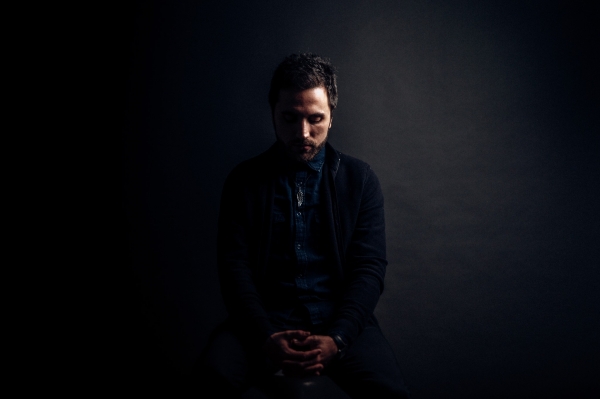
KP: If you could have any three wishes, what would they be?
HS: You know, maybe I never thought of that question. I tend to be rational so I don’t waste my time wishing, but doing! And in a way, I’m really satisfied with how my personal life is going at the moment. But since you ask, professionally I guess I would love to have more and more concerts and more “free” time to compose and learn and read more music. That would be my wish number one. Secondly, without trying to turn this political at all, but I wish some people wouldn’t make so much of an effort to put up borders of any kind amongst us. This is the only chance we have to live and the only planet we have. I don’t want to sound sentimental, but it really breaks my heart - or even worse, it insults my intelligence - witnessing how we are capable of outstanding achievements such as going to the Moon, building huge skyscrapers or developing medical treatments; whilst constantly showing the absolute misery of human “morality” and destroying mother Earth. Could that be wishes number two and number three joined into a big one?
KP: Absolutely! Is there anything else you’d like to talk about?
HS: Nothing about myself - that was more than enough! But if it’s not an inconvenient, I would like to say thanks to you. It’s lovely to see how hard you work on your website: the reviews, the interviews... I wish there were more like you, serious and devoted to their craft. Ooops, that would be wish number three… Or four? Sorry!
Many thanks to Hugo Selles for taking the time for this interview! For information about Hugo and his music, please visit
his website and his
Artist Page here on MainlyPiano.com.
Kathy Parsons
January 2020

